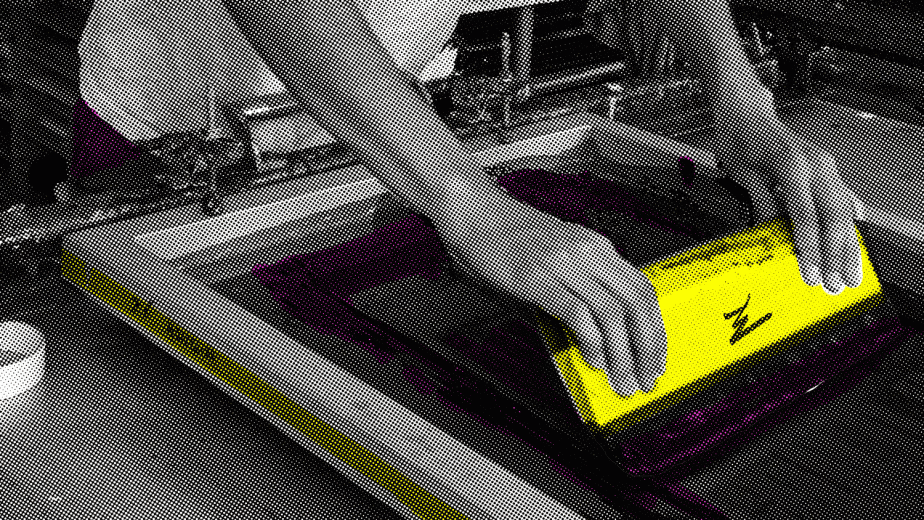Most visual creatives thrive for immediate results in their work. You work on what you see and you see what you are working on. It is not about speed, it’s about the constant sensorial stimulus of a project and the effort that is behind it all.
When talking to several artists, the most common answer to “why do you enjoy screen printing?” is that they feel like they can produce something themselves. It’s all about taking matters into your own hands.
Isn’t that the pure essence of freelancing?
Screen what?
You might have heard of “Screen printing” or “Silkscreen printing”, perhaps even the uncommon “serigraphy” followed by artists’ names like Andy Warhol or Roy Lichtenstein, but what is it exactly?
Wikipedia says it is “not to be confused with print screen”. A common mix-up and nothing to do with this. Screen Printing is a stencil-based printmaking technique primarily focused on batch reproduction of a design.
First, you manually push ink through a mesh that is holding a design and onto a substrate, usually paper or t-shirts.

Simply put, you pass ink through a stencil and onto paper, or whatever surface you want.

Your design is broken down into a layer per colour and made into stencils in a framed mesh, what we call a screen. It is easy to picture the screen as a flat sieve, where you block the net where you don’t want the ink to flow down.

By doing so, you have just made a stencil! Each screen will generally correspond to a colour, having one screen for a one-colour design or two screens for a two-colour design, and so on.

Let’s say your poster is made with only blue and black tones. Then you would separate the two, putting all the blues in one screen and all the blacks in the other. All your posters would be printed in a blue layer first, followed by a black layer afterwards.

Seem complicated? It’s much simpler when you do it
With this complex process comes the feeling that you can do it! You quickly start demystifying the technique and realise you can make your own indie band’s merchandising, or your own line of notebooks, and perhaps even flyers for your event.
That’s exactly how I got into screen printing. Suddenly, I could apply my graphic skills into something I could control, see and feel. I had found a way to combine design with a hands-on craft that would get me all inked up. Once I got the gist of the technique, I then started to explore with it, printing onto anything I could get my hands on (bioplastics and tiles were a real challenge). Six years down the line and I still have much to try.
I have now set up a screen-printing business. Alternating between my own work, print commissions and a new and crazy experience here and there. I take the opportunity to spread my art as far as I can and meet some interesting people as well. What better way to relate to other designers, illustrators and artists than to share a print?
Get on board with it
Following Andy Warhol’s footsteps, many other artists have taken production into their own hands. Printing in multiples enables you to meet the buyer half-way, allowing your art to reach more people and thus sell for a cheaper price.
Whether you print it yourself or commission a screen print, manual craft always adds an extra value to a product of an artistic nature. Not only this, there are certain colours and techniques that are exclusive to screen printing. How many times have you struggled to get that punchy colour that you see in an RGB (Red, Green, Blue, the additive colour system that we see on screens) screen and it never comes out in the CMYK (Cyan, Magenta, Yellow, Black, the subtractive colour system that we see) inks combination? How would you get a metallic ink into your print otherwise? Screen printing is your most accessible solution. Not to mention a lot of fun.
Should you start screen printing your own designs, I would say the most cliché tips apply. First of all, experiment. Secondly, have fun doing so, otherwise what’s the point? Practice, practice, practice is my advice. You are bound to find some technical hurdles. I have been lucky enough to find a studio where I can ask anything to my peers, and that has propelled my technique and career forward. My last tip would be to do the same. You will find yourself giving tips to new printmakers in no time.

